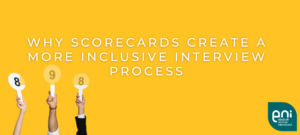Why Scorecards Create a More Inclusive Interview Process
Something that’s come up several times in conversations with clients when discussing making a more inclusive interview process, is scorecards. Some of our clients already use these and they’ve proven to be more impactful, provide more transparency and remove bias from the interview process.
How would this work?
Whether you work with a recruiter, or you apply this internally, here’s how you would utilise the use of scorecards. We’ve also highlighted ways they can be beneficial.
When discussing the requirements for a role, instead of looking for someone with 12/12 of the bullet points on the list, focus on the skills and competencies needed to do the job. We’d advise 5 strong points. If you were hiring an Analyst for example, this might look like:
- Candidate was able to demonstrate understanding and experience using Adobe Analytics.
- Candidate was able to provide actionable insights based on data sets provided/assessed.
- Candidate has provided evidence they are able to present this back to senior employees/clients, clearly.
And so on. This might be based on 1-5 markings, in which you would fill in once you have met and assessed the candidate on the above points. By scoring candidates based on pre-agreed criteria, you/your team are less likely to rely on unconscious biases when assessing candidates.
They also allow for more efficient decision making, making it clear that the scores are performance based, who is best fit for the role and aligns with the job requirements. As they’re designed to focus on job-related competencies and qualifications, it rules out any feedback being based on irrelevant factors, reducing the likelihood of stereotyping, or making assumptions about candidates based on other characteristics.
According to a CNBC survey, 80% of respondents said they want to work for a company that values DE&I, so getting this right in the initial stages could really help with employee attraction and retention!
We have found it also creates consistency having used a scorecard system when interviewing internally for ENI. All candidates are assessed against the same criteria which creates a level-playing field, making it easier to compare against the others.
Adapting to this method also means you take accountability for the marks you give. When you are made to give honest answers based on the criteria it makes it easier to identify and address any discriminatory practices.
We love data in this industry, and this approach gives you that! Companies can gather the data and analyse it for any potential patterns to help make better decisions going forward.
We could go on about accessibility, the protection it gives you as a business, etc. but if you do want to know more about the pro’s, we’d be happy to chat through these – it doesn’t cost a thing to make such a small change, that can have a much bigger impact than you realise.
Get in touch: hello@elizabethnorman.com
For more tips on inclusive interviewing, advert writing and processes, head back to our DE&I section under Resources.

